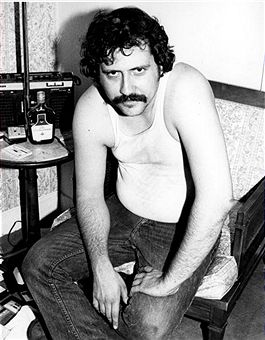
Leslie Conway "Lester" Bangs was an American music journalist and critic. He wrote for Creem and Rolling Stone magazines and was also a performing musician. The music critic Jim DeRogatis called him "America's greatest rock critic".

The Band was a Canadian-American rock band formed in Toronto, Ontario, in 1967. It consisted of Canadians Rick Danko, Garth Hudson, Richard Manuel, Robbie Robertson, and American Levon Helm. The Band combined elements of Americana, folk, rock, jazz, country, influencing musicians such as George Harrison, Elton John, the Grateful Dead, Eric Clapton and Wilco.
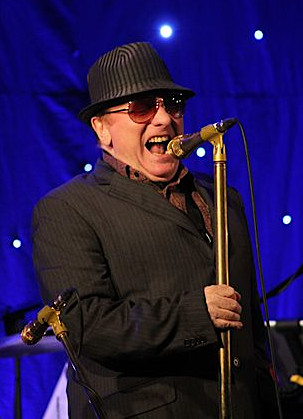
Sir George Ivan MorrisonOBE is a singer-songwriter and musician from Northern Ireland whose recording career spans seven decades.

"Like a Rolling Stone" is a song by the American singer-songwriter Bob Dylan, released on July 20, 1965, by Columbia Records. Its confrontational lyrics originated in an extended piece of verse Dylan wrote in June 1965, when he returned exhausted from a grueling tour of England. Dylan distilled this draft into four verses and a chorus. "Like a Rolling Stone" was recorded a few weeks later as part of the sessions for the forthcoming album Highway 61 Revisited.
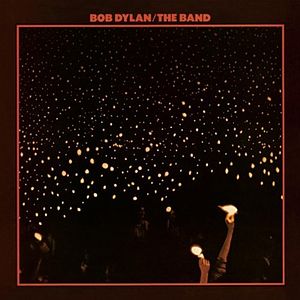
Before the Flood is a live album by American singer-songwriter Bob Dylan and The Band, released on June 20, 1974, on Asylum Records in the United States and Island Records in the United Kingdom. It was Dylan's first live album, although live recordings of earlier performances would later be released. It is the 15th album by Dylan and the seventh by the Band, and documents their joint 1974 American tour. It peaked at No. 3 on the Billboard 200, reached No. 8 on the popular album chart in the UK, and has been certified Platinum by the Recording Industry Association of America.

Mojo is a popular music magazine published monthly in the United Kingdom, initially by Emap, and since January 2008 by Bauer. Following the success of the magazine Q, publishers Emap were looking for a title that would cater for the burgeoning interest in classic rock music. The magazine was designed to appeal to the 30 to 45-plus age group, or the baby boomer generation. Mojo was first published on 15 October 1993. In keeping with its classic rock aesthetic, the first issue had Bob Dylan and John Lennon as its first cover stars. Noted for its in-depth coverage of both popular and cult acts, it acted as the inspiration for Blender and Uncut. Many noted music critics have written for it, including Charles Shaar Murray, Greil Marcus, Nick Kent, David Fricke, Jon Savage and Mick Wall. The launch editor of Mojo was Paul Du Noyer and his successors have included Mat Snow, Paul Trynka, Pat Gilbert and Phil Alexander. The current editor is John Mulvey.

Dave Marsh is an American music critic and radio talk show host. He was an early editor of Creem magazine, has written for various publications such as Newsday, The Village Voice, and Rolling Stone, and has published numerous books about music and musicians, mostly focused on rock music. He is also a committee member of the Rock and Roll Hall of Fame.

Bob Dylan is an American singer-songwriter. Often considered to be one of the greatest songwriters in history, Dylan has been a major figure in popular culture over his 60-year career. He rose to prominence in the 1960s, when his songs "Blowin' in the Wind" (1963) and "The Times They Are a-Changin'" (1964) became anthems for the civil rights and antiwar movements. Initially modeling his style on Woody Guthrie's folk songs, Robert Johnson's blues, and what he called the "architectural forms" of Hank Williams's country songs, Dylan added increasingly sophisticated lyrical techniques to the folk music of the early 1960s, infusing it "with the intellectualism of classic literature and poetry". His lyrics incorporated political, social, and philosophical influences, defying pop music conventions and appealing to the decade's burgeoning counterculture.
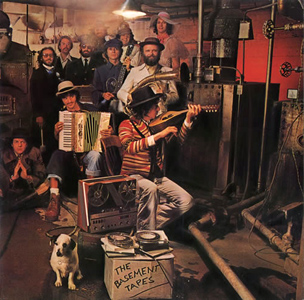
The Basement Tapes is the sixteenth album by the American singer-songwriter Bob Dylan and his second with the Band. It was released on June 26, 1975, by Columbia Records. Two-thirds of the album's 24 tracks feature Dylan on lead vocals backed by the Band, and were recorded in 1967, eight years before the album's release, in the lapse between the release of Blonde on Blonde and the subsequent recording and release of John Wesley Harding, during sessions that began at Dylan's house in Woodstock, New York, then moved to the basement of Big Pink. While most of these had appeared on bootleg albums, The Basement Tapes marked their first official release. The remaining eight songs, all previously unavailable, feature the Band without Dylan and were recorded between 1967 and 1975.

Invisible Republic: Bob Dylan's Basement Tapes (1997) is a book by music critic Greil Marcus about the creation and cultural importance of The Basement Tapes, a series of recordings made by Bob Dylan in 1967 in collaboration with the Hawks, who would subsequently become known as the Band. (ISBN 0-8050-5842-7)
"Tears of Rage" is a song with lyrics written by Bob Dylan and music by Richard Manuel. Dylan and the Band first recorded the song in 1967, but it was not released until 1975 on The Basement Tapes album. In 1968, the Band recorded it for their debut album Music from Big Pink.
"Too Much of Nothing" is a song written by Bob Dylan in 1967, first released by him on the album The Basement Tapes (1975).

"Rough God Goes Riding" is the opening song on the album, The Healing Game by Northern Irish singer-songwriter Van Morrison. The song reached No. 168 on the UK charts. One of the B-sides of the single, the alternative version of "The Healing Game", appears on all three editions of Morrison's 2007 compilation album Still on Top - The Greatest Hits. The other B-side "At the End of the Day" was released as a bonus track on the 2008 reissue of The Healing Game.
This is a list of books published by and about Bob Dylan.
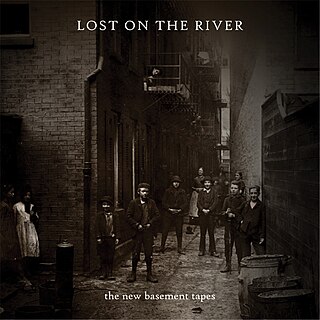
Lost on the River: The New Basement Tapes is an album produced by T Bone Burnett featuring a collective of musicians recording under the moniker The New Basement Tapes—Elvis Costello, Rhiannon Giddens, Taylor Goldsmith, Jim James and Marcus Mumford.

Michael Goldberg is an American novelist, journalist, animal rights activist, and pioneering digital music entrepreneur. He is known for his work (1983-1993) at Rolling Stone, where he was first a senior writer and later West Coast editor, and for envisioning and co-founding the first web music magazine, Addicted to Noise, in 1994, for which Newsweek included him in its 1995 "Net 50" list of "the 50 People Who Matter Most on the Internet". Between 2014 and the fall of 2016 he published the Freak Scene Dream trilogy of 1970s coming-of-age novels, and worked actively in animal rights causes. His nonfiction book, Wicked Game: The True Story of Guitarist James Calvin Wilsey, was published in June of 2022.
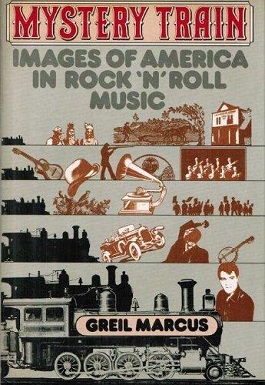
Mystery Train: Images of America in Rock 'N' Roll Music is a non-fiction book written in 1975 by Greil Marcus. It features critical essays centered around artists such as Elvis Presley, Sly Stone, Robert Johnson, and Randy Newman.

Critic's Choice: Top 200 Albums is a musical reference book compiled by American-British journalist and broadcaster Paul Gambaccini. It was first published in the United Kingdom by Omnibus Press in January 1978, and then by Quick Fox in the US. The book comprises an annotated and illustrated list of the best albums in popular music, as selected from top-ten lists provided by its 47 contributors. As a multi-contributor work seeking to critique rock and pop albums, Critic's Choice preceded The Rolling Stone Record Guide and the Greil Marcus-edited Stranded: Rock and Roll for a Desert Island, both published in 1979. It was followed by several other books that classified the best pop recordings.















